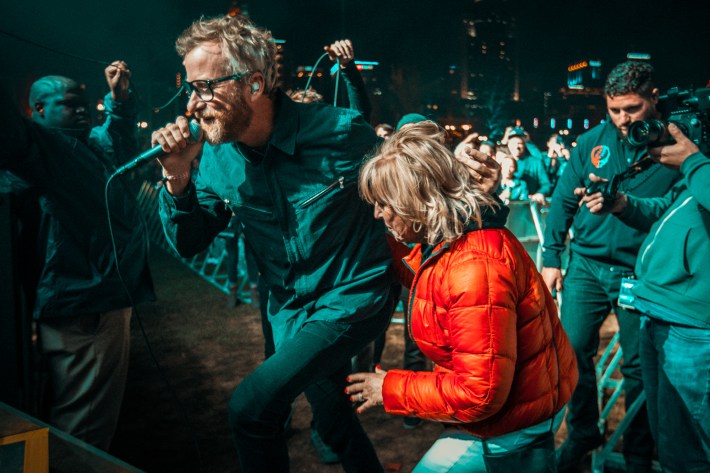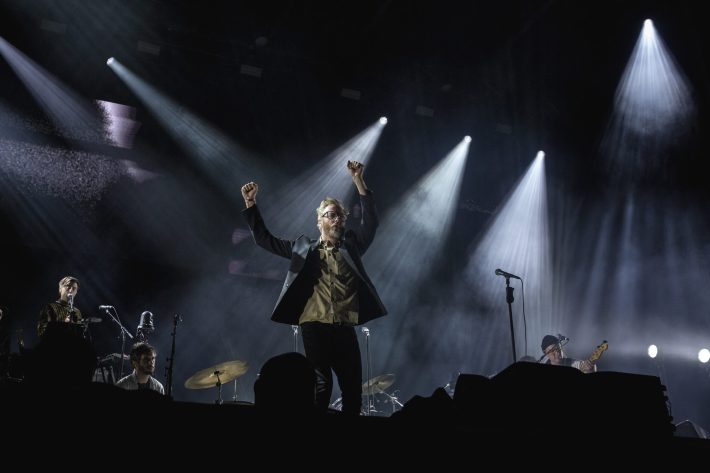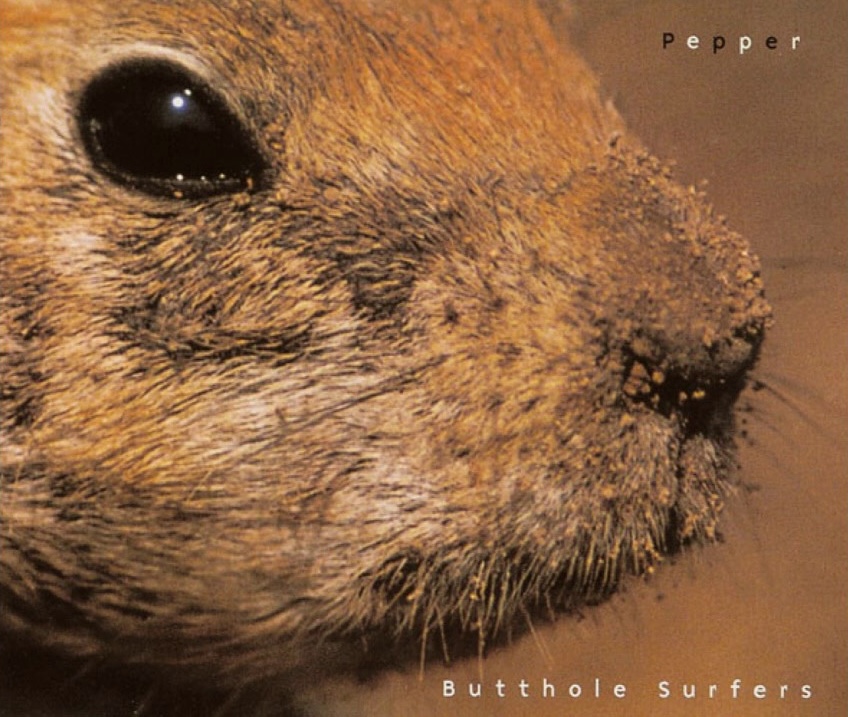"OK, let's party." Those were the first words out of Matt Berninger's mouth Saturday night, and man, did he ever.
The National were back in Cincinnati for their inaugural Homecoming Festival, a more accessible evolution of Bryce Dessner's longstanding avant-garde and neoclassical event MusicNOW. Since 2006 that event has hosted adventurous, often collaborative performances featuring an impressive list of artists including Joanna Newsom, Sufjan Stevens, Philip Glass, Steve Reich, Justin Vernon, St. Vincent, Nico Muhly, Dirty Projectors, Grizzly Bear, various Arcade Fire members, Perfume Genius, Glenn Kotche, the Books, Robin Pecknold, Sharon Van Etten, Tim Hecker, and more. For years I've been kicking myself for skipping this Midwestern hidden treasure despite living just two hours up the road in Columbus. Maybe I just needed the promise of a drunk-as-fuck Matt Berninger having the time of his life to get me down to the Queen City?
This year MusicNOW continued apace with the likes of Mouse On Mars, Sam Amidon, and Bonnie "Prince" Billy descending upon the city's performance halls and museums. But for the first time it was supplemented (and frankly overshadowed) by Homecoming, an event on the Cincinnati riverfront that -- despite its loving curation, gorgeous downtown setting, and relatively humble scope -- more closely resembled your average indie-leaning American outdoor music festival. There were beer tents, food vendors, and port-o-potties. There were two big stages at opposite ends of a park -- in this case bifurcated by the magnificent Roebling Bridge, where dozens of bystanders without tickets took in the festivities all weekend. Most importantly, there was an impressive lineup of relatively big-name musicians performing music that mostly erred on the pop side of the spectrum, removing the real or imagined barriers to entry implied by the comparatively stodgy MusicNOW programming.
Which brings us back to Berninger, the baritone who suffuses the National's stately indie rock with both gravitas and jocular instability. The band's internal dynamic can be understood like this: Brothers Scott and Bryan Devendorf provide a subtly virtuosic, rock-solid foundation. Twin brothers Bryce and Aaron Dessner, creative visionaries both, lend the music its artful splendor. And then there's Berninger, the tall, disheveled poet -- alternately dour and hilarious, sometimes gracefully bellowing and sometimes shredding his goddamn throat. Saturday night he was in rare form.
The band headlined both nights of Homecoming, with Sunday reserved for a run through 2007's legacy-cementing Boxer. Saturday, then, was more of a conventional National set -- except the circumstances weren't conventional at all. Although the National began in Brooklyn, each of the band's five members hails from Cincinnati. Now, nearly two decades into their career, they were returning to their hometown as conquering heroes, throwing a weekend-long party where a bunch of their talented peers would entertain their friends, family, and fellow Ohioans. So when they took the stage Saturday just after sunset, in unseasonably bitter cold, their performance was spiked by the warmth of a family reunion and the ecstatic tenor of a championship parade.
Who knows what else it was spiked with. All I know is Berninger was fired up and delightfully loopy in front of a crowd dotted with old pals and relatives of the band. Seemingly all of them got songs dedicated to them, as did Berninger's wife and brother, who weren't even present. On "I Need My Girl," he sang, "There's some things that I should never laugh about in front of family," but he stifled laughter more than once while attempting to sing lyrics Saturday. One of those crack-ups happened when the singer climbed off the stage to interact with the audience out of view; turns out he was raging with his parents. "Could someone get the mud off my mom's butt?" he asked. "I knocked her in the mud puddle."

During one of the show's more raucous moments Berninger threw his mic across the stage, aggressively pumped his fist, and spat water at the audience. His voice cracked more often and more harshly than I've ever heard it at a half-dozen other National gigs. He attempted an ill-fated spin move during "Dark Side Of The Gym" -- "Nailed it!" -- and repeatedly introduced backup singer Lisa Hannigan, noting he'd seen her seated overlooking the Ohio River that afternoon. He later remarked, "Lisa Hannigan! She'll be in a swing down by the river... We'll be in a van." When the National emerged for their encore, he explained that they would have returned sooner but he got lost inside a port-o-let.
Some other choice Berninger quips from Saturday:
• "I found a spot where I'm pretty sure I barfed 25 years ago."
• "David Duchov-a-ny. I like to quote David Duchov-a-ny a lot. Agent... whatever. Actually, I'm not gonna do it."
• "That was for Pete Rose! Fuck yeah!"
His demeanor made for a, shall we say, loose performance. But far from undermining the National's usual grandeur, the messiness amplified the ferocity that has always coursed within this band's music. That was true on firebrands new ("Turtleneck," "Day I Die," "Sea Of Love") and old ("Abel," "Mr. November," surprisingly not "Lit Up" -- too on-the-nose?). It was equally true of intense, smoldering ballads like "Wasp Nest" and the opening "Nobody Else Will Be There." Stone-cold classics "Afraid Of Everyone" and "Secret Meeting" sounded transcendent; deep cuts "England" and "Rylan" sounded like stone-cold classics. "Bloodbuzz Ohio" was as magnificent as you'd expect given the context. The show-closing a cappella sing-along of "Vanderlyle Crybaby Geeks" was even better -- one of those tingle-all-over moments you hope for when you attend a concert.
https://youtube.com/watch?v=ag3gX6iRdOg
https://youtube.com/watch?v=KxyXA8RKBmA
All that, and the weekend's main event was still to come. Come nightfall Sunday, the National were back on stage by the Ohio, delivering another consummate two-hour set. This was the spotlight moment for Boxer, but they of course kept going after that, right back into their seemingly bottomless well. They didn't repeat a single song from the night before. One lesson from this weekend was that just when you think the National are about to run out of fan favorites, they crack open another cask of songs and keep going.
But we're getting ahead of ourselves here. First it was Boxer time. "We're gonna play all our songs correctly tomorrow," Berninger had promised, and yes, this second night was not so slaphappy. In keeping with the refined sophistication that characterizes their definitive album -- the one "where the National became the National as we know them" -- they mostly reined in the previous evening's mangier qualities. Or at least they did for those first 12 songs, instead channeling their powers into re-creating Boxer with just the right amount of extra life and color.
Boxer was a pivotal album not just for the National but for indie-rock at large. Not only did the project's ornate arrangements and urbane sensibility represent the National establishing its signature sound, the template from which they've continued to work with in the decade since. Those qualities were also key to transforming the genre from scrappy kid stuff into an elegant grownup concern, the province of not just basements and dive bars but theaters and festivals. Quite literally: The first time I saw the National in concert they were touring behind Boxer at a crappy corporate concert venue called The Basement, and now here they were revisiting the album at their very own bespoke lifestyle event.
Back at that Basement show, I was surprised and delighted to learn what an electrifying live act the National are. Boxer has its aggressive moments, but they're as polished and controlled as the somber ballads that comprise a good chunk of the tracklist. Even the loud parts are majestic. In concert these dramatic swells are pushed into the red, dotted with feral Berninger outbursts borrowed from the more overtly explosive Alligator era. Back in '07, that era had just ended, so Alligator comprised a significant portion of their setlist. Between those tracks and the charged-up renditions of Boxer songs, that Basement show was a blast of cathartic energy ripping through in a tight space.

That energy remained at Homecoming, dispersed across the expanse of humanity between the stage and Roebling Bridge, floating upward and outward over the river. In a less compact environment, Boxer felt less combustible and more simply grandiose. Which is not to say the album seemed soft. Watching Boxer in sequence 11 years later, the two aspects that stood out most were Bryan Devendorf's pounding, tumbling, walloping drum work -- complex without being showy, elevating the music without hogging the spotlight -- and the way almost every song built to a big, magnificent conclusion.
Piano ballad "Fake Empire" bloomed into an onslaught of militaristic drums and triumphal brass. Propulsive rocker "Mistaken For Strangers" expanded from a series of contained blazes into an inferno. "Brainy," "Squalor Victoria," "Apartment Story," "Guest Room" -- each exquisite offering packed a big finish. They added some flourishes from band buddy Sufjan Stevens' "Chicago" to the end of "Ada." Even quieter numbers like "Green Gloves," "Slow Show," and "Start A War" got blown-out conclusions that amplified their comparatively subdued studio finales. The Dessner brothers had many occasions to lift their guitars skyward as the National conjured glorious noise. As for Berninger, he was more in his right mind Sunday, but there was still plenty of dancing, mic-throwing, splashing drinks, and such. They somehow made an album about aging into isolation feel like a celebration.
Theoretically, the problem with performing Boxer front to back is that it ends with a series of somber ballads. The National solved this by ramping up the banter between songs as the tracklist progressed into darkness. There was comedy, like Berninger shaking a tambourine and explaining, "They give me one solo every night -- here it is!" and facetiously claiming he wrote a lot of Sufjan's "Chicago" album. (His bandmates informed him the record is actually called Illinois.) He later alluded to a "brain bridge" between twin guitarists Aaron and Bryce that allows one to scratch the other's ear without prompting. "You're not the first to bully us about twin stuff," one of them replied. (Bryce, I think?) There was also trivia: We learned the band had forgotten the order of songs on Boxer, that "Start A War" was to be the opener at one point, that while recording that song they wasted a day in the studio trying to play a guitar with pencils.
The Boxer portion of the show concluded peacefully and unceremoniously with "Gospel," and then they were off to the races again (racing like pros, you might say) with another hour of assorted classics. Berninger returned to the audience several times. He ventured way out to the right while the band extended a lively "The System Only Dreams In Total Darkness." He returned to rocking out with his family during a raucous "Conversation 16." ("Watch your step, mom!") He plunged deep down the middle amidst the exhilarating, main-set-closing "Graceless" and may or may not have been crowdsurfing. He topped mic stands and auxiliary percussion amidst the encore's inevitable, gratifying "Terrible Love" bombardment.
In the moments when the whirlwind calmed, there was more swaying beauty: "Pink Rabbits," "Born To Beg," a new one in the encore called "Light Years." Eventually it all started to blur together, as tends to happen when a band is well into their fourth hour of original material. But the night's final song snapped this moment back into focus.
Sunday's encore concluded with "About Today," a gem from 2004's Cherry Tree EP that proved the National were a treasure well before the world started paying attention. The song, another ballad unfolding into another astonishing sonic tableau, chronicles a moment of a relationship in crisis, when it seems like love might not survive the next fight. A lot of National songs are like that: scenes of heartache and turmoil excerpted from some larger unseen narrative. But throughout four hours over two nights, all these downtrodden snapshots added up to joy.
Other notable moments from Sunday at Homecoming:
• I cannot say enough good things about Big Thief's mid-afternoon set. The band's recorded material did not prepare me for how hard they rock live. Adrianne Lenker was on her guitar hero shit, ripping twisted solos worthy of Jack White. Her voice, too, was a beacon. Lenker and her bandmates converged country, indie rock, folk, and classic rock into this shapeshifting entity all their own. They sounded strong and delicate in equal measure -- a reminder of how much a band can accomplish within the standard confines of two guitars, bass, and drums. They turned me from a casual admirer to an outright fan.
• Alvvays, on the other hand, I fully expected to love -- and I did. As they played the final set before the National's Boxer gig, the only note-taking I could manage was scrawling "awesome" next to each of the 12 songs I saw them perform. In the live setting, the Toronto band's dreamy guitar-pop feels less like a faded memory and more like vibrant, dynamic reality.

• Feist's coral, floor-length dress was the most striking wardrobe choice of the weekend -- a shot of color to match the rock 'n' roll rawness her Pleasure era has injected into her sophisticated pop of old. During "Any Party" she repeatedly tried to convince people in the crowd to approach someone they hoped to take home tonight, which was slightly awkward. She also performed her recent Broken Social Scene track "Hug Of Thunder" during a Feist gig for the first time, which was nice.
• Shout out to Kaitlyn Aurelia Smith for making a solo experimental electronic performance work in a wide-open outdoor space. Tasked with beginning the day's main-stage festivities, the Los Angeles musician turned in a pleasing array of flickering melodies, bird sounds, dense synth drones, and heavenly processed vocals that were a perfect fit for a sun-speckled spring afternoon. She set Sunday off right.






